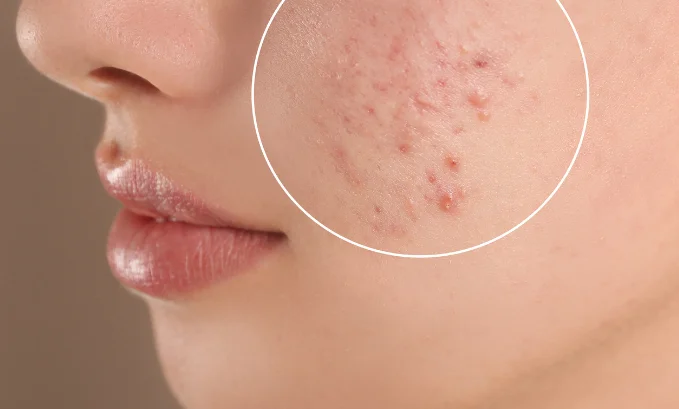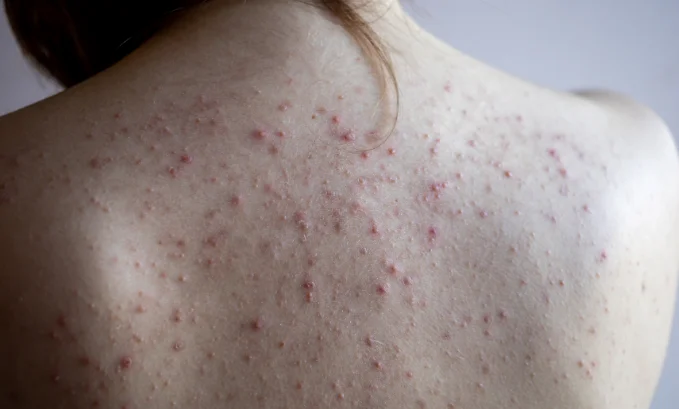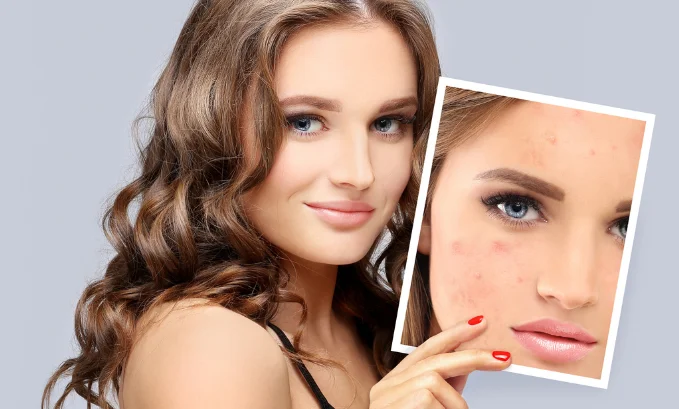
The following blog post is for entertainment and informational purposes only. It is not intended to provide medical advice or diagnosis. Please consult your doctor before making any health-related decisions.
An outstanding medicine Tirzepatide activates GIP and GLP-1 receptors. It demonstrates effective results in treating type 2 diabetes and obesity. This medicine has received great attention due to its metabolic advantages of enhancing sugar regulation in the blood and inducing weight reduction. However, Tirzepatide may have possible therapeutic implications on skin well-being.
Can Tirzepatide Cause Acne? People Ask
The primary use of Tirzepatide is applied for the healing of type 2 diabetes and obesity. This medicine offers significant outcomes to metabolism – better control over blood sugar concentrations and weight loss. However, there are not enough clinical studies demonstrating a direct relationship between using Tirzepatide and acne development. Nonetheless, certain mechanisms associated with its method of action and metabolic impacts may potentially affect skin health leading to an outbreak of acne.
Mechanisms of the Link Between Tirzepatide and Acne

1. Hormonal Influence
Tirzepatide’s main function is aimed to advance insulin sensitivity and control glucose exchange processes. Nonetheless, alterations in hormone levels brought about by Tirzepatide to insulin can affect the condition of skin health – facilitating acne growth or aggravation.
The improved glucose control results from the medicine’s administration due to its ability to advance insulin sensibility. Nonetheless, this action impacts the hormone secretion of testosterone. This hormone falls under the androgens category (male hormones).
Because of increased androgen levels, the skin’s sebaceous glands can generate more oil (sebum). This excess sebum can mix with bacteria and deceased skin cells. So, it can obstruct pores and facilitate the progress of acne.
Modifications in calorie intake or eating habits can have additional effects on hormone amounts and metabolic function. Together they may have an impact on skin health.
GLP-1 receptors are found not just in pancreatic cells. They also spread across different tissues of the body and in the skin. The activation of these receptors might have an effect on cellular functions and inflammatory responses in the skin. As a result, this process may cause unpleasant reactions to Tirzepatide and acne.
2. Metabolic Changes
People with obesity can lose weight because of using Tirzepatide. This medicine can cause changes in body excess weight and fat distribution. These results have the possibility to affect hormone levels – insulin and male hormones (androgens).
The improvement of insulin sensibility has the potential to impact hormone generation and exchange processes. So, the use of Tirzepatide can potentially cause changes in the levels of androgens. Such alterations may affect sebum creation within the skin.
The use of Tirzepatide can affect metabolic processes by altering diet and calorie intake. Hormone amounts and general metabolic function actively impact skin health. They are influenced largely by dietary factors.
The composition of the gut microbiota can be influenced by alterations in diet and medicine usage. This leads to systemic inflammation and metabolic responses. This may have an impact on skin conditions.
GLP-1 receptors are present in the whole organism and in the skin. Their activation may alter inflammatory responses and cellular processes within the skin. As a result, this could have an impact on the manifestation of the unpleasant effects of Tirzepatide and acne.
The impact of this medicine on metabolic pathways could potentially affect the functioning of the immune system and inflammatory processes, both playing crucial roles in determining the development as well as severity level associated with acne.
3. Indirect Effects on Skin Health
It is possible that the activation of GLP-1 receptors in different tissues, including skin tissue, can have a potential impact on inflammatory pathways and overall skin well-being. Even though there is limited direct evidence to support this claim, its indirect effects are reasonable.
Clinical Observations and Evidence
Although there are limited studies on the direct connection between Tirzepatide and acne, evidence from clinical trials and patient feedback implies that alterations in hormonal balance as well as metabolic function might lead to skin-related unfavorable effects of Tirzepatide and acne.
The use of this medicine may result in skin changes such as alterations in texture or heightened occurrences of acne breakouts for certain people. These effects can differ significantly from person to person.
Does Tirzepatide Cause Acne and How to Manage It?

Although it is recognized for its tremendous benefits in enhancing insulin sensitivity and inducing weight loss, some apprehensions have surfaced regarding its probable repercussions on skin wellness. Specifically, there are concerns that medicines like Tirzepatide cause acne or worsen this condition.
In case you encounter some unpleasant effects of Tirzepatide and acne, contemplate using the following approaches:
Skincare Routine
To effectively manage the unfavorable adverse effects of Tirzepatide and acne, you need to establish a reliable skincare regimen. The drug’s impacts on insulin sensibility and metabolic functions. This may have secondary effects on skin health and lead to increased instances or worsening of some effects of Tirzepatide and acne in some cases. Therefore, developing an individualized approach toward maintaining healthy skin can be beneficial in controlling breakouts when using Tirzepatide treatment.
1. Gentle Cleansing
Excess oil, dirt, and impurities block pores and promote acne growth. Their removal and effective skin cleansing helps to prevent clogged pores.
Choose a mild non-comedogenic and tailored to your specific skin type cleanser – foaming or gel-based formulas.
You need to avoid blocked pores. So, cleanse your face two times each day – in the morning and at night. Also, wash your face after any physical activity or sweating.
2. Moisturizing
Maintaining the skin barrier function and preventing aggravation of some effects of Tirzepatide and acne necessitate adequate hydration.
You need to prevent pore blockage. So, opt for a non-comedogenic moisturizer. It must be free from oil.
To retain the skin’s moisture, you must apply moisturizer right after cleansing while the skin remains damp.
3. Choosing Ingredients to Fight Acne
Including particular elements recognized for their ability to battle some unpleasant skin effects of Tirzepatide and acne may diminish breakouts and enhance the clarity of your skin.
Seek out items that possess benzoyl peroxide, salicylic acid, or glycolic acid in their composition to alleviate plugged pores and mitigate bacteria responsible for causing acne.
It may be helpful to utilize a spot treatment specifically designed for active breakouts and applied directly to affected areas.
4. Sun Protection
It is vital to shield the skin from damaging UV rays, particularly while utilizing acne remedies that could heighten vulnerability to sunlight.
You must apply sunscreen with an SPF of 30 or more every day. It must encompass all wavelengths.
To prevent clogging of pores, you can opt for a non-comedogenic sunscreen.
To manage the adverse skin effects of Tirzepatide and acne effectively, you must adopt a personalized skincare routine according to your skin type and needs. Gentle cleansing, appropriate moisturizing, selecting ingredients to combat acne, safeguarding against sun damage with protective measures, and avoiding harsh products present effective measures. Consistent implementation of this tailored regimen can promote healthy skin function while minimizing any potential side effects from the medication.
Hydration
To maintain overall skin health and avoid the negative impacts of dehydration, you must consume ample quantities of water that keep your skin moisturized. Insufficient hydration and medicines like Tirzepatide cause acne. So, high moisture levels and consuming water can also assist in alleviating any potential side effects of Tirzepatide and acne.
Consult Your Medical Service Specialist
You can face some unpleasant effects of Tirzepatide and acne. So, you need to seek advice from your medical service professional. Let’s delve into the reasons behind this importance and learn how to proceed with discussing acne management with them:
Importance of Consulting Your Medical Service Specialist

1. Understanding the Potential Causes
The insulin sensitivity-boosting effect of Tirzepatide can impact hormone levels, including androgens that play a role in sebum production and the formation of acne.
The utilization of Tirzepatide for weight management and dietary modifications might affect skin health as well as hormone levels.
Assessing whether this medicine interacts with other medications that may have an impact on the skin effects of Tirzepatide and acne can be determined by your medical service provider.
2. Personalized Recommendations
Tailored advice can be provided by your medical service provider. It will take into account factors of your medical history, current medication, and skincare regime.
It is possible for them to ascertain whether acne has a direct correlation with Tirzepatide or if other variables like hormonal fluctuations and skincare items are also influential.
3. Treatment Adjustments
Your medical service provider may suggest modifying your dosage or treatment plan to reduce skin-related side effects of Tirzepatide and acne, according to their evaluation.
Acne treatments or skincare products customized to your skin type and requirements can be prescribed by them, guaranteeing efficient management while optimizing the curative advantages of Tirzepatide.
Questions to Discuss with a Medical Service Specialist
You need to provide details about the kind of acne you have. Inform about its location on your body. Redness or irritation can occur.
Discuss your facial cleansers, moisturizers, and remedies for acne.
You can express any apprehensions about acne. You must outline your objectives for preserving the well-being of your skin on Tirzepatide.
Get ready with any queries relating to the management of potential side effects of Tirzepatide and acne or its possible interactions with other medications.
Follow-Up and Monitoring
Your medical service professional might arrange subsequent appointments to observe how your skin responds to treatment modifications and provide additional advice if required.
Make sure to maintain ongoing communication with your medical service provider, informing them of any alterations in your skin or worries as they arise.
It is crucial to consult with your medical service provider in effectively managing the unpleasant skin effects of Tirzepatide and acne. By sharing details about your symptoms, skincare regimen, and treatment objectives, you can collaborate to identify the ideal approach for minimizing acne and enhancing overall health. With their professional knowledge, your medical service provider can offer personalized care and tailored advice that aptly addresses both diabetes management as well as skin health concerns.






